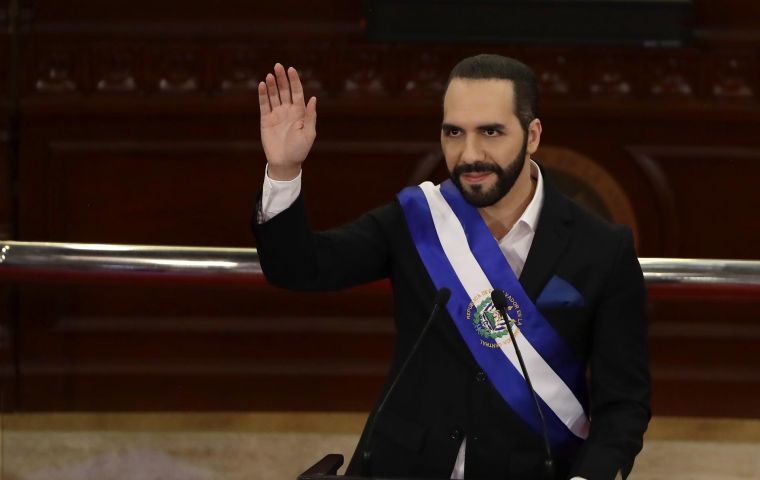MercoPress. South Atlantic News Agency
El Salvador likened to Nicaragua for its human rights policy
 Bukele claims that with these special powers he is close to winning the war against gangs
Bukele claims that with these special powers he is close to winning the war against gangs Human rights organizations have raised their concerns over the current situation in El Salvador, where the demise of rule of law is becoming the new “norm.”
The Inter-American Commission on Human Rights has issued a warning to Salvadorean President Nayib Bukele, reminding him it was his duty to respect human rights, with which Amnesty International's Director for the Americas Erika Guevara Rosas agreed, saying El Salvador was a signatory of the Rome Statute, and as such, it should submit to the International Criminal Court (ICC).
The IACHR reminded Bukele that the state of siege or state of exception he seems determined to extend ad infinitum was not legitimate and urged the authorities to respect the principle of due process and stop the mistreatment and deaths of people held in jails.
According to Guevara, the current state of things in El Salvador “ends up dismantling state institutions and the rule of law.” The country has been under this emergency regime for over two months after an escalation of murders at the end of March attributed to gangs, mainly the Mara Salvatrucha (MS13).
Bukele claims that with these special powers he is close to winning the “war” against gangs, with more than 37,000 arrests, of which, he maintains, 1% could be a “mistake.”
Human rights defenders have collected 1,123 reports of abuses, mainly arbitrary detentions of people who claim not to have links with the so-called maras, of whom 24 have died while in custody. The Human Rights Ombudsman's Office (PDDH) has received another 700 complaints, it was reported.
Guevara Rosas presented in El Salvador the preliminary findings of an investigation that concluded that “grave violations” of human rights are being committed in the Central American country.
“The preliminary conclusion of the highest concern is that these regimes of exception, these extensions are not the exception but become the norm and that this ends up dismantling state institutions and the rule of law,” Guevara told EFE.
In approving Bukele's request for extraordinary powers, lawmakers only had to nod, since there were no studies or a Parliamentary debate in a Congress dominated by the party Nuevas Ideas (NI), which holds the absolute majority and is led by a cousin of the president. The current Congress Speaker is a former Bukele aide.
Guevera added that even before the exception regime, “had we already been raising the global alert about significant and emblematic signs of a decomposition of the State institutions, of a dismantling of the Rule of Law, of an impossibility to exercise the defense of human rights and independent journalism.”
She also pointed out that the penal law reforms introduced under this legal framework “generate the perfect storm for a context of human rights violations.”
Bukele's official discourse shows “a total intolerance to constructive criticism and international scrutiny, which have been very serious signs in other countries of the continent,” she added.
Guevara referred to Bukele as one of those “authoritarian leaders who impose absolute control of power.”
“Undoubtedly, we see very similar signs to what we have seen in countries like Nicaragua,” she underlined.
Guevara Rosas insisted AI's investigation had documented “multiple human rights violations,” including “arbitrary detentions, violations of due process or the presumption of innocence.”
She also pointed out there were “reports of torture” and “deaths that have occurred in custody,” which also “represents an enormous concern for what it means in the exercise of rights.”
In presenting the conclusions of the investigation, Guevara Rosas said that these types of studies are carried out whenever systematic violations of rights are suspected of taking place in a country and that “the policy implemented by the government could give rise to international criminal responsibility.”
Asked if the ultimate responsibility would fall directly on President Bukele, Guevara replied that “that would have to be determined through investigations.”
“El Salvador, by signing and ratifying the Rome Statute, is one of the member states that submit to the International Criminal Court,” Guevara also pointed out.
The Salvadorean Constitution explicitly establishes a republican order based on the separation of powers through institutional checks and balances to guarantee legal minimums that have been systematically violated since May 1 last year when the legislature passed Bukele's bills regarding the Judiciary and also sinking the country deeper into debt, the IACHR stressed.




Top Comments
Disclaimer & comment rulesCommenting for this story is now closed.
If you have a Facebook account, become a fan and comment on our Facebook Page!